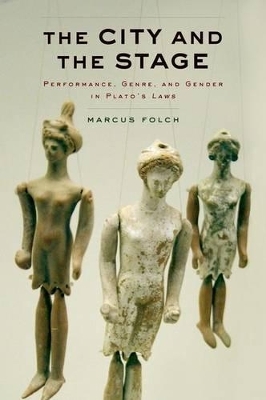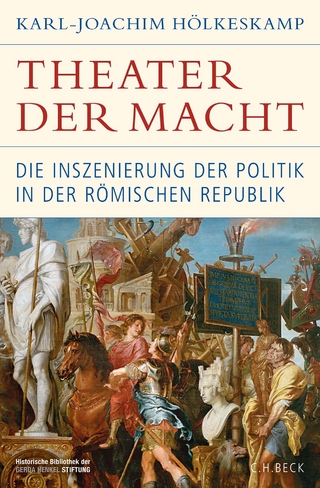
The City and the Stage
Oxford University Press Inc (Verlag)
978-0-19-026617-2 (ISBN)
What role did the performance of poetry, music, song, and dance play in the political life of the ancient city? How has philosophy positioned itself and articulated its own ambitions in relation to the poet tradition? The Polis and the Stage poses such questions through a reading of Plato last, longest, and unfinished work, the Laws. Plato's engagement with the Greek poetic tradition has long been recognized as foundational in the history of literary criticism, but the broader critical and philosophical significance of the Laws has been largely ignored. Although Plato is often thought hostile to mimetic art, famously banishing poets from the ideal city of the Republic, this book shows that in his final dialogue Plato made a striking about-face, proposing to rehabilitate Athenian performance culture and envisioning a city, in which poetry, music, song, and dance are instrumental in the cultivation of philosophical virtues. The psychological underpinnings of aesthetic experience and the power of mimetic art to predispose a society to specific kinds of constitutions are central themes throughout this study. Plato's views of the performative properties of language and genre receives systematic treatment in this study for the first time. Performance as a mechanism of sexual construction-a network of social practices uniquely suited to communicate and enforce normative conceptions of gender and erotic pleasure-is another focus, with special attention given to positions occupied by women in the culture envisaged in the Laws. As a whole, Marcus Folch's book provides an integrated interpretation of Plato's final dialogue with the Greek poetic tradition, an exploration of the dialectic between philosophy and mimetic art, which will be of interest to anyone concerned with understanding ancient Greek performance and the emergence of philosophical discourse in fourth-century Athens.
Marcus Folch is Assistant Professor of Classics at Columbia University. His published work includes studies of ancient Greek literature, philosophy, and literary criticism, as well as classical reception in the 20th century.
Introduction: Performance and the Second-Best City ; Abstract ; 1 Introduction ; 2 An Ancient Quarrel Revisited ; 3 The Laws, Its City, Its Scope ; 4 Paradigmatism and the 'Second-Best' Politeia ; 5 The Correct Method (orthe methodos) of Cultural Criticism ; 6 Conclusions ; Notes ; Chapter 1. Marionettes of the Soul: Performance and the Psychology of Mousike in Plato's Laws ; Abstract ; 1.1 Introduction ; 1.2 Theoretical Orientations: Performance, Performativity, Political Dissent ; 1.3 Of Puppets and Passions: The Moral Psychology of Performance in Plato's Laws ; 1.4 Virtue, Education, Aesthetic Response: A Model of Performativity ; 1.5 Inscription and the Making of a Philosophical Performance Culture ; 1.6 Conclusions ; Notes ; Chapter 2. The Chorus and the Critic: Literary Criticism, Theatrocracy, and the Performance of Philosophy ; Abstract ; 2.1 Introduction ; 2.2 Critical Errors: Genre, Theatrocracy, and the Unideal City ; 2.3 Setting the Stage: Pleasure, Judgment, and the Performance of Philosophy ; 2.4 Beyond the Choral Muse: The Chorus of Dionysus and the Metaphysics of Literary Criticism ; 2.5 Conclusions ; Notes ; Chapter 3. Laws' Genres: Hymns, Encomia, and the Remaking of Lament ; Abstract ; 3.1 Th Introduction: ; 3.2 The Laws' Genres: Hymns, Encomia, and the Politics of Euphemia ; 3.3 The Laws in Praise and Blame ; 3.4 Funerary Regained ; 3.5 Conclusions ; Notes ; Chapter 4. Unideal Genres and the Ideal City: Comedy, Tragedy, and the Limits of the City Dancing ; Abstract ; 4.1 Introduction ; 4.2 Comedy, Threnody, and the Performance of Alterity ; 4.3 From Antithesis to Identity: Comedic and Iambic Invective ; 4.4 Plato's Tragic Muse ; 4.5 Beyond the Politics of Performance: ta bakkheia and the Genres of Ecstasy ; 4.6 Conclusions ; Notes ; Chapter 5. Women's Statuses in Plato's Laws: Nature, Gender, Law, and the Performance of Citizenship ; Abstract ; 5.1 Introduction ; 5.2 'Natural' Heterosexuality ; 5.3 Transgendered Virtues and the Social Contract ; 5.4 Natural Correction: Feasting, Warfare, Schooling, and the 'Trope of Life' (tropos tou biou) ; 5.5 Unnatural Limitations: The Political Lives of Women ; 5.6 Conclusions ; Notes ; Chapter 6. Engendering Harmonies: Women's Songs in Plato's Laws ; Abstract ; 6.1 Introduction ; 6.2 Veils of Silence: Women, Theater, and Performance in Athens and Magnesia ; 6.3 Performance, Performativity, and the Making of Citizen Women ; 6.4 'Cultic Citizenship' Revisited: Lament and the Female Voice ; 6.5 Conclusions ; Notes ; Epilogue. Plato's Last Long: A Postlude on Law and the Preludes ; Bibliography
| Erscheint lt. Verlag | 11.2.2016 |
|---|---|
| Verlagsort | New York |
| Sprache | englisch |
| Maße | 236 x 163 mm |
| Gewicht | 649 g |
| Themenwelt | Literatur ► Klassiker / Moderne Klassiker |
| Literatur ► Lyrik / Dramatik ► Dramatik / Theater | |
| Geschichte ► Allgemeine Geschichte ► Altertum / Antike | |
| Geisteswissenschaften ► Philosophie ► Philosophie Altertum / Antike | |
| Geisteswissenschaften ► Sprach- / Literaturwissenschaft ► Anglistik / Amerikanistik | |
| Geisteswissenschaften ► Sprach- / Literaturwissenschaft ► Literaturwissenschaft | |
| Sozialwissenschaften ► Politik / Verwaltung | |
| Sozialwissenschaften ► Soziologie | |
| ISBN-10 | 0-19-026617-1 / 0190266171 |
| ISBN-13 | 978-0-19-026617-2 / 9780190266172 |
| Zustand | Neuware |
| Haben Sie eine Frage zum Produkt? |
aus dem Bereich


